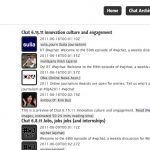Traditionally, news organizations have drawn clear distinctions between opinion and factual reporting. And in the event of even the appearance of a conflict of interest, the reporter is reassigned.
This convention of journalistic ethics is one of the reasons newspapers, magazines and broadcasters are often reluctant to write about the industry in which they work. The problem is, the media are powerful. What journalists write and say can make the difference in clarifying complex public policies, helping consumers make wise decisions and preventing social and even criminal injustice.
With that in mind, the Public Press commissioned a team of experienced journalists to report — and in some cases reflect on — the rapidly changing media landscape. All have conflicts of interest in that they make their living, as best they can, in what remains of the news industry. Nonetheless, we thought that this was an important story to tell. Where appropriate, we have indicated what those interests and biases are.
In the vein of disclosure, we should also explain how this project came about. The Public Press won a subcontract on a federal Department of Labor study of displacement of journalists in the San Francisco Bay Area during the last decade, in collaboration with Natelson Dale Group in Yorba Linda, California.
The contractor on the “Research Study of Workforce Dislocation Among San Francisco Bay Area Journalists” was the North Valley Job Training Consortium, or NOVA, whose aim was to provide the legions of jobless journalists opportunities to improve their skills or transition to other kinds of work.
The Public Press was paid to hire and manage a team of researchers early this year to track down thousands of current and former Bay Area journalists, of whom more than 700 completed a detailed online survey called the San Francisco Bay Area Journalist Census. Visit journalistcensus.org to read the full report.
We used the expertise we acquired through that research to launch a more targeted explanatory project about the state of the local news media. The Department of Labor contract was not, however used to pay journalists.
The Public Press raised $1,179.39 in addition to the $2,000 it paid in freelance fees to the reporters using the nonprofit journalism micro-funding website Spot.Us.
It is impossible to avoid change as the practice of journalism evolves. We thought we could tell an important story even if our methods broke with tradition. Our guide, however, was the Society of Professional Journalists’ code of ethics.
The section titled “Act Independently,” counsels, among other things: “Avoid conflicts of interest, real or perceived,” “Disclose unavoidable conflicts” and “Be vigilant and courageous about holding those with power accountable.”









